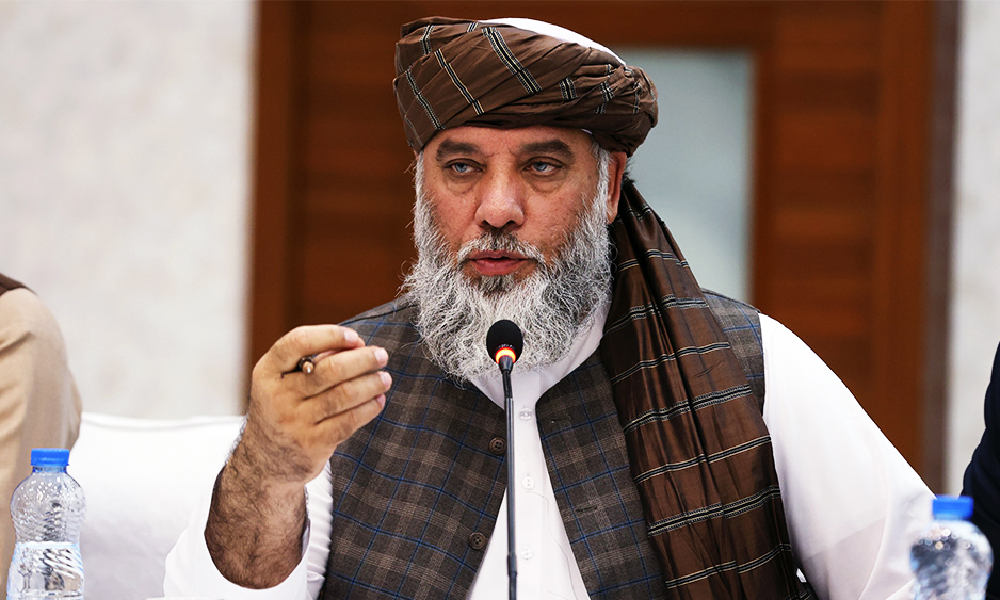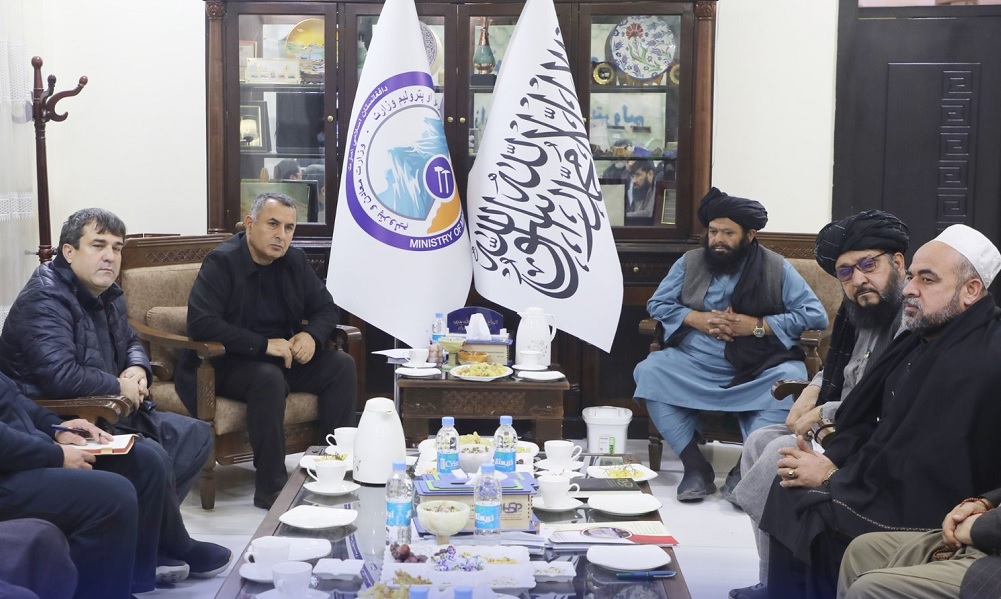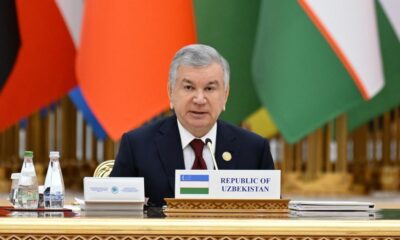Business
IEA plans regional energy trade hub with Russian oil in mind

The Islamic Emirate of Afghanistan (IEA) has agreed with Kazakhstan and Turkmenistan to build a logistics hub in western Afghanistan aimed at making the war-torn nation a major logistics point for regional exports, including oil from Russia to South Asia, the country’s commerce minister said.
Following a meeting between representatives of the three countries in the Afghan capital last week, IEA’s acting commerce minister Nooruddin Azizi told Reuters that technical teams would draw up a written agreement within two months on the formal plans for the hub, which all three countries would invest in after six months of talks.
As foreign aid to Afghanistan falls and the predominantly agricultural economy is marred by persistent drought, its officially unrecognised IEA government has faced questions over how to fund development and avoid economic stagnation, Reuters reported.
Azizi said the new hub was part of broader efforts to take advantage of Afghanistan’s strategic location, once a thoroughfare for the ancient Silk Road trade route, lying between South and Central Asia and sharing borders with China and Iran.
“Based on our discussions, a logistics centre is going to be established in Herat province, which can connect the north to South Asia,” Azizi said, adding that the Taliban (IEA) was eyeing the millions of tons of oil they expected Russia would be selling in coming years to South Asian countries, particularly Pakistan, to pass through the new hub.
“The three countries have done their best to prove Afghanistan’s claim as a connectivity point,” he said.
“Reaching Pakistan through Afghanistan will be the best option,” Azizi added, saying they were focused on Russia’s petroleum exports and that Kazakhstan was also planning to export goods through Herat into South Asian markets.
Kazakhstan’s trade ministry said in a statement to Reuters that it wanted to develop roads and a railway through Afghanistan to connect with South Asia and the Gulf, with the hub serving as an important logistics point.
“The creation of the hub will allow for the development of multi-modal services by consolidating truck shipments in the dry port where they will be sorted and sent along railroads on the North-South corridor to sea ports in the Gulf, Pakistan, and Indian Ocean, towards India,” the statement said.
Azizi said the logistics hub’s initial capacity would be one million tons of oil but he did not give a date for when it would be operational.
Turkmenistan’s government did not immediately respond to a request for comment and the Russian government did not respond to a request for comment during a national holiday.
Pakistan’s foreign office and energy minister did not respond to a request for comment. Pakistan is a major trading partner with Afghanistan and has signed on to regional energy connectivity agreements, Reuters reported.
However, Islamabad has had strained relations with the IEA in recent years over accusations Afghanistan is harbouring anti-Pakistan militants, which Kabul denies.
Cash-strapped Pakistan last year became Russia’s latest customer, snapping up discounted crude that has been banned from European markets due to Russia’s war on Ukraine.
Afghanistan also buys oil, gas and wheat from Russia at discounted rates.
Azizi said that the IEA was also speaking with Chinese authorities on building a road through the remote, narrow Wakhan corridor that connects Afghanistan with China and that they hoped Afghanistan would eventually develop into a route for trade between China and Iran. He said Afghan commerce ministry officials had been recently been sent to China for training.
Business
Tajik investors express interest in cement production in Afghanistan

A delegation of Tajikistani investors has expressed interest in establishing a cement production factory in Afghanistan, signaling renewed economic engagement between the two neighbors after four years of limited activity.
The delegation met with Hedayatullah Badri, Afghanistan’s Minister of Mines and Petroleum, to discuss potential investment opportunities in the country’s mining and industrial sectors. Officials said the visit reflects Tajikistan’s increasing willingness to expand economic cooperation with Afghanistan.
During the meeting, the Tajik investors praised the Islamic Emirate for what they described as improved security and a more conducive investment environment across Afghanistan.
Minister Badri welcomed the investors’ proposal and assured them of the government’s full support, emphasizing that Afghanistan is ready to facilitate investment through streamlined procedures and favorable conditions.
Representatives of Afghanistan’s private sector also view the development as a positive step toward strengthening bilateral economic ties.
Abdul Jabbar Safi, head of the Afghanistan Industries Association, said:
“After four years, Tajikistan is looking to take part in Afghanistan’s economic sector. This is encouraging news for the governments and the people of both countries.”
Economic experts believe that deeper economic engagement between Afghanistan and Tajikistan could unlock significant mutual benefits.
Nazir Ahmad Khalil, an economic analyst, said: “Tajikistan and Afghanistan share language, culture and geography. Expanding trade and investment between the two countries can meaningfully improve their economic situations. Building trust will be essential for long-term cooperation, and such investment can play a major role in poverty reduction and confidence-building.”
This new chapter of economic cooperation between Afghanistan and Tajikistan comes at a time when, since the return of the Islamic Emirate to power, several major projects have been launched between Afghanistan and Central Asian states.
The leadership of the Islamic Emirate has repeatedly emphasized that it seeks to strengthen economic relations with neighboring countries, the region, and the wider world on the basis of mutual respect.
Business
Trade bodies warn almost 11,000 Afghan transit containers stuck at Karachi port
SCCI officials urged authorities to separate trade from political tensions and immediately launch dialogue to restore commercial traffic between the two countries.

Trade bodies report that nearly 11,000 Afghan transit trade containers are stranded at Karachi port, while thousands more— including shipments of perishable goods—remain stuck at the Ghulam Khan, Spin Boldak, Kharlachi, and Torkham crossings between Afghanistan and Pakistan.
Traders involved in Pakistan–Afghanistan bilateral and transit commerce say they have suffered billions of Pakistani rupees in losses as the prolonged border shutdown continues to stall the movement of goods. Perishable food items have already begun to spoil, compounding financial losses.
They also report a sharp drop in bilateral trade volumes. Exporters who were already issued Form-E certificates have been unable to dispatch consignments, with the closure now nearing two months.
Sarhad Chamber of Commerce and Industry (SCCI) President Junaid Altaf said trade—already limited—has deteriorated further due to the closure of crossings. He estimated losses of roughly $45 million since the Torkham closure began, adding that the halt is damaging for both economies and directly affecting families whose livelihoods depend on trade.
SCCI officials urged authorities to separate trade from political tensions and immediately launch dialogue to restore commercial traffic between the two countries.
In recent weeks, repeated closures of the Pakistan–Afghanistan crossing have also brought pharmaceutical exports to a halt, putting nearly $200 million worth of medicines at risk. Hundreds of trucks carrying antibiotics, insulin, vaccines, and cardiovascular drugs remain stuck at Torkham and Chaman, with temperature-sensitive supplies facing potential spoilage.
The Pakistan Pharmaceutical Manufacturers Association (PPMA) warned that the disruption extends far beyond Afghanistan’s medicine supply. Afghanistan is Pakistan’s main overland route to Uzbekistan, Tajikistan, Turkmenistan, and Kazakhstan, and ongoing shutdowns are undermining key regional connectivity projects, including the Pakistan–Uzbekistan–Afghanistan railway.
Stakeholders are calling for urgent steps to reopen the crossings, warning that prolonged closures threaten not only pharmaceutical exports but Pakistan’s broader economic engagement across the region.
Business
Pakistan’s citrus export crisis deepens amid ongoing Afghanistan trade route closure
Afghanistan, which absorbs around 60% of Pakistan’s citrus exports, has remained closed to trade since mid-October.

Pakistan’s citrus sector is facing a worsening export crisis as the closure of the Afghanistan crossing continues to block access to its largest market.
Despite the start of the 2025 citrus season, exports are set to fall further from an already steep decline — dropping from $211 million in fiscal year 2021 to just $92.5 million in fiscal year 2025.
Afghanistan, which absorbs around 60% of Pakistan’s citrus exports, has remained closed to trade since mid-October.
This year alone, Pakistan shipped 153,683 tonnes of citrus to Afghanistan, while exports through the Afghan transit route also supply Russia, Kazakhstan, and Uzbekistan. With that corridor shut, exporters warn that the bulk of Pakistan’s kinnow harvest could go unsold.
A temporary policy exemption now allows citrus shipments to transit through Iran, but exporters say volumes to Central Asia and Russia cannot compensate for the loss of the Afghan market.
The crisis, however, goes deeper than the current crossing closure situation. Pakistan’s citrus industry continues to suffer from long-standing structural challenges — including reliance on the outdated, seeded kinnow variety that makes up over 90% of exports.
Climate change, rising pest pressure, shrinking yields, and declining A-grade fruit quality have all eroded competitiveness. Yields have fallen to about six tonnes per acre, and nearly half of kinnow processing units have closed.
Global competitors such as Egypt, China, Spain, Morocco, and Brazil have overtaken Pakistan by introducing new seedless, high-yielding varieties with longer harvest windows. As profits shrink, farmers are abandoning citrus orchards: the cultivated area has dropped 16% in the past five years.
Experts say Pakistan must urgently invest in developing seedless, climate-resilient varieties and strengthen existing research centres. At the same time, trade officials need to diversify export destinations by securing new sanitary and phytosanitary agreements to reduce dependence on a single market.
Without structural reforms and diversified access, Pakistan’s signature fruit risks losing its place in global markets — and its farmers risk losing their livelihoods.
-

 Sport4 days ago
Sport4 days agoILT20: Desert Vipers edge Gulf Giants in historic super over thriller
-

 Latest News2 days ago
Latest News2 days agoMuttaqi: Afghanistan’s progress requires both religious and modern education
-

 Regional4 days ago
Regional4 days agoSix Pakistani soldiers killed in TTP attack in Kurram District
-

 Business4 days ago
Business4 days agoTrade bodies warn almost 11,000 Afghan transit containers stuck at Karachi port
-

 World4 days ago
World4 days agoPowerful 7.6 earthquake hits northern Japan, tsunami warnings issued
-

 Latest News3 days ago
Latest News3 days agoTrump calls Afghanistan a ‘hellhole’ country as US expands immigration restrictions
-

 Sport5 days ago
Sport5 days agoSorkh Poshan Khafi defeats Sarsabz Yashlar 4-0 in Afghanistan Champions League
-

 Sport3 days ago
Sport3 days agoCommanding wins for Arman FC and Sarsabz Yashlar in Afghanistan Champions League
























